Personality & the Brain - A New Perspective on the MBTI's ENFJ
Personality & the Brain - A New Perspective on the MBTI's ENFJ
Through the lens of the Striving Styles, each of the Myers-Briggs (MBTI®) 16 Types comes alive. Discover which quadrant of the brain the ENFJ prefers to use, what the predominant, innate psychological need that drives the ENFJ's behavior is, as well as how an ENFJ can leverage their whole brain in order to develop and achieve their potential.
Four Quadrant Model of the Brain
The SSPS shows that each of the four quadrants of the brain has their own role, or function, to play in our personality and our consciousness. Based on Jung's Theory of Psychological Type, we are hard-wired to prefer one function or quadrant over the others and we use each quadrant or function in either an inwardly or an outwardly way.
The ENFJ's Predominant Striving Style is the Socializer, which is rooted in the right emotional brain (Jung's Feeling function) and focused externally. The purpose of the right emotional brain is to have emotional experiences. It focuses on present moment experiences as they relate to past emotional memories, and is able to use imagination or memory to produce feelings on demand. The most subjective part of the brain, it decides the value, attractiveness or aversiveness of an event, object, or situation. This means that it figures out whether we like something or not. It compares and judges what is being experienced and generates feelings about it based on those judgments. Because we are all attracted to and repelled by different things, this subjective valuing is unique to each person.
The right emotional brain doesn’t know why it feels what it feels, it only knows what it feels, and feelings are more important than anything else going on. The holistic nature of this part of the brain means that it doesn’t separate what is felt from itself, or feeling from fact. If it feels it, it must be true. It also seeks to create harmony and is easily pulled-off center by emotional conflict. It will focus on restoring harmony by adapting behavior or emotions or expecting others to adapt theirs during disagreements or in emotional climates.
Drivers of Human Behavior: Needs & Emotions
Each of us is driven by powerful, instinctual needs and have been since birth. These needs are a source of motivation and influence our behavior. When our predominant need is met, we are poised for growth. When our need is not met, fear and anxiety override rational, leading to self-protective or survival behaviors.
ENFJs, as Socializer Style people, have a predominant need to be connected. Charming and appealing, they easily build and maintain positive relationships with a wide variety of people. They aim to be helpful, and are enthusiastic, amiable, outgoing “people-people” whose relationships are at the center of their lives. Socializers believe in a social order and want to know where stand. They will do their best to rise to the top of the social hierarchy where they can best influence the behavior of others.
When their need to be connected is frustrated, the Self-Protective System of the Socializer (ENFJ) is activated, causing survival behaviors to emerge including:
- expect everyone to conform to their social rules and values;
- need others to need and depend on them and give unsolicited advice and help;
- portray themselves as long-suffering, especially when not appreciated;
- are co-dependent and create co-dependency in relationships; do things with “strings attached.”
Using the Whole Brain: Striving Style Squad
Going beyond the descriptors of the MBTI, the SSPS shows people how to access and integrate all four quadrants of their brain in order to use their whole brain as it is intended. There are four Styles that make up a person's Striving Style Squad, each with its own role to play in our personality based on where they reside in the brain.
The Striving Style Squad for the ENFJ is: Socializer Predominant Style with Visionary, Intellectual & Adventurer Associate Styles. Each Associate Style on the Squad also has a specific need that must be met and different innate talents that allow it to meet that need. Often, we neglect the development of the Associate Styles, resulting in the overuse of our Predominant Style which is a detriment to our confidence and mental health.
If we are not using the appropriate quadrant of our brain and its associated Style for its intended purpose, we end up using a different part of our brain in a way that it was not intended to be used. This can limit our flexibility, drain us of valuable internal resources, and ultimately thwart our development and growth in life.
Want to know more about the Striving Style Squad of the ENFJ? Download our PDF now!
To learn about the other MBTI Types, click here.

Socializer Right Striving Style Squad: Socializer Predominant with Visionary, Intellectual and Adventurer Associates. Learn how to develop the whole brain of an ENFJ with our Leveraging Your Squad Report.

Join us for one of our upcoming webinars. We offer a variety of webinars on other topics to help you take the MBTI to the next level! LEARN MORE...







